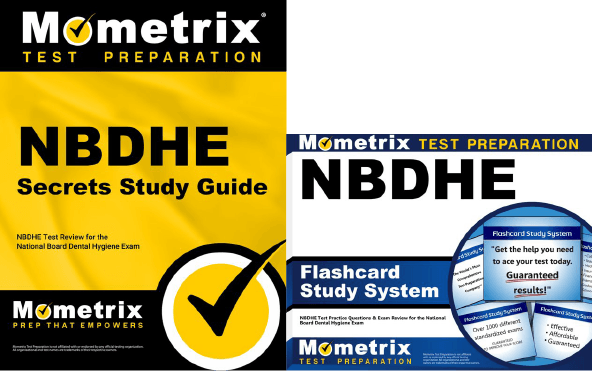If you need help studying for the NBDHE or just want some more information about what the test is like, you’ve come to the right place.
Click below to take a free NBDHE practice test!
What’s on the NBDHE Exam?
How to Register
How is the NBDHE Exam Scored?
Retaking the Exam
What Test-Takers Are Saying
FAQs
NBDHE Eligibility
Before you can register to take the NBDHE exam, you’ll have to meet at least ONE of the requirements below:
- You are a dental hygiene student in a program accredited by CODA
- You have graduated from a CODA-accredited dental hygiene program
- You have graduated from a non-accredited dental hygiene program with a letter of recommendation from an accredited dean/director and from the secretary of a board of dentistry
If you meet one of these requirements, you’re set to begin the registration process!
What’s on the Exam?
First, let’s talk about the questions on the exam. There are 350 multiple-choice questions total, but not every question on the exam will count toward your score. Why is that?
The unscored questions on the NBDHE exam are called “experimental” questions. These are added to the exam to determine if they’re good enough questions to add to future versions of the test.
The trick is that you won’t have any way of knowing which questions are scored and which ones are pretest. They will appear just like the scored questions throughout the test.
The time limit for the exam is 7.5 hours, and you get one 30-minute break between testing sessions. You may also take a scheduled 15-minute break during each session if you’d like.
Let’s take a closer look at the different sections of the NBDHE exam.
Session 1
1. Scientific Basis for Dental Hygiene Practice
61 questions
- Anatomy
- Physiology
- Nutrition and biochemistry
- Microbiology and immunology
- Pathology
- Pharmacology
2. Provision of Clinical Dental Hygiene Services
115 questions
- Assessing patient characteristics
- Obtaining and interpreting radiographs
- Planning and managing dental hygiene care
- Performing periodontal procedures
- Using preventive agents
- Providing supportive treatment services
- Professional responsibility
3. Community Health/research Principles
24 questions
- Promoting health and preventing disease within groups
- Participating in community programs
- Analyzing scientific literature
- Understanding statistical data
Session 2
Case-Based Questions
14-16 cases
- Assessing patient characteristics
- Obtaining and interpreting radiographs
- Planning and managing dental hygiene care
- Performing periodontal procedures
- Using preventive agents
- Providing supportive treatment service
- Professional responsibility
How to Register
Once you’ve ensured that you meet all of the eligibility requirements, you can start the registration process for the exam!
To get started, you’ll need to create a DENTPIN and submit an application on JCNDE’s website.
A DENTPIN is a Dental Personal Identifier Number. This eight-digit number protects your personal information, similar to a social security number or your PIN for your debit card.
You can register for a DENTPIN via the ADA’s website. The good news is that it’s completely free!
Once your application has been sent and approved, you’ll be ready to schedule your testing appointment.
How is the NBDHE Exam Scored?
The NBDHE is scored using a scaled scoring method. Here’s how it works:
For every question you answer correctly, you get one point added to your raw score. At the end of the test, your final raw score will be converted to a scaled score. This scaled score will range somewhere between 49 and 99.
The reason your raw score is converted to a scaled score is because everyone who takes the NBDHE exam is given a slightly different set of questions. Since everyone has a different arrangement of questions, and because some questions are harder than others, converting your raw score to a scaled score ensures a more even playing field.
Retaking the Exam
If you didn’t get a passing score on your first try, that’s okay! You can take the exam again up to three more times within a year, with a waiting period of 60 days between each attempt. After your fourth attempt, the waiting period increases to 12 months.
What Test-Takers Are Saying
Don’t just take our word for it! See what real test-takers are saying about the NBDHE:
“My exam was very heavy in pharmacology and radiology (especially radiographic landmarks). Just MAKE sure you are understanding why your answers are correct or not correct and not just memorizing them. The test is not memory based—it is critical thinking.”

Busy_Reputation516
“Know radiology, landmarks, what’s normal vs what’s not (path), ASA, AAP, best/types of DH treatment, contradictions to treat, considerations for meds/medical conditions/dental habits, best products, and so forth.”

Oceaannie
“Really know your blood pressure classifications, ASA, staging and grading (memorize the table!), how to calculate CAL, occlusion class relationships, emergency situations ((I had a lot of questions giving me a scenario with signs/symptoms and I had to choose what to administer or do in the emergency situation), radiology anatomy, and oral pathology.”

itschelseyks
FAQs
How many questions are on the NBDHE?
The exam contains 350 multiple-choice questions.
How long is the NBDHE?
The exam is timed at 7.5 hours.
What is the passing score for the NBDHE?
The minimum score you need to pass is 75.
Mometrix Test Preparation is not affiliated with or endorsed by any official testing organization. All organizational and test names are trademarks of their respective owners.



 NBDHE Study Guide
NBDHE Study Guide NBDHE Flashcards
NBDHE Flashcards
